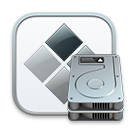See also
- Snow Leopard Trust, an organisation working for the conservation of the snow leopard
- Snow lion
The snow leopard is a type of large cat.
Snow Leopard, snow leopard or The Snow Leopard may also refer to:

macOS, originally Mac OS X, previously shortened as OS X, is an operating system developed and marketed by Apple since 2001. It is the primary operating system for Apple's Mac computers. Within the market of desktop and laptop computers, it is the second most widely used desktop OS, after Microsoft Windows and ahead of all Linux distributions, including ChromeOS.
QuickTime is a discontinued extensible multimedia architecture created by Apple, which supports playing, streaming, encoding, and transcoding a variety of digital media formats. The term QuickTime also refers to the QuickTime Player front-end media player application, which is built-into macOS, and was formerly available for Windows.

Mac OS X Server is a series of discontinued Unix-like server operating systems developed by Apple Inc. based on macOS. It provided server functionality and system administration tools, and tools to manage both macOS-based computers and iOS-based devices, network services such as a mail transfer agent, AFP and SMB servers, an LDAP server, and a domain name server, as well as server applications including a Web server, database, and calendar server.
The history of macOS, Apple's current Mac operating system formerly named Mac OS X until 2011 and then OS X until 2016, began with the company's project to replace its "classic" Mac OS. That system, up to and including its final release Mac OS 9, was a direct descendant of the operating system Apple had used in its Mac computers since their introduction in 1984. However, the current macOS is a UNIX operating system built on technology that had been developed at NeXT from the 1980s until Apple purchased the company in early 1997.
Xcode is Apple's integrated development environment (IDE) for macOS, used to develop software for macOS, iOS, iPadOS, watchOS, tvOS, and visionOS. It was initially released in late 2003; the latest stable release is version 15, released on September 18, 2023, and is available free of charge via the Mac App Store and the Apple Developer website. Registered developers can also download preview releases and prior versions of the suite through the Apple Developer website. Xcode includes command-line tools that enable UNIX-style development via the Terminal app in macOS. They can also be downloaded and installed without the GUI.

XNU is the computer operating system (OS) kernel developed at Apple Inc. since December 1996 for use in the Mac OS X operating system and released as free and open-source software as part of the Darwin OS, which, in addition to being the basis for macOS, is also the basis for Apple TV Software, iOS, iPadOS, watchOS, visionOS, and tvOS.
The leopard is one of the five "big cats" in the genus Panthera.

Mac OS X Leopard is the sixth major release of macOS, Apple's desktop and server operating system for Macintosh computers. Leopard was released on October 26, 2007 as the successor of Mac OS X Tiger, and is available in two editions: a desktop version suitable for personal computers, and a server version, Mac OS X Server. It retailed for $129 for the desktop version and $499 for Server. Leopard was superseded by Mac OS X Snow Leopard in 2009. Mac OS X Leopard is the last version of macOS that supports the PowerPC architecture as its successor, Mac OS X Snow Leopard, functions solely on Intel based Macs.

The Mac transition to Intel processors was the process of switching the central processing units (CPUs) of Apple's line of Mac and Xserve computers from PowerPC processors over to Intel's x86-64 processors. The change was announced at the 2005 Worldwide Developers Conference (WWDC) by then-Apple CEO Steve Jobs, who said Apple would gradually stop using PowerPC microprocessors supplied by Freescale and IBM.
Bertrand Serlet is a French software engineer and businessman; he worked first at the Institut national de recherche en informatique et en automatique (INRIA) before leaving France for the United States in 1985. He was the Senior Vice President of Software Engineering at Apple Inc.

Unsanity was a macOS shareware software developer founded in May 2000, notable for coining the term "haxie". Unsanity produced Mac utilities that relied on their own Application Enhancer, a utility that modified the system and other applications. Software incompatibility with Mac OS X Leopard, Snow Leopard, and Lion ended Unsanity's offerings.

Boot Camp Assistant is a multi boot utility included with Apple Inc.'s macOS that assists users in installing Microsoft Windows operating systems on Intel-based Macintosh computers. The utility guides users through non-destructive disk partitioning of their hard disk drive or solid-state drive and installation of Windows device drivers for the Apple hardware. The utility also installs a Windows Control Panel applet for selecting the default boot operating system.
Dashcode was a software application created by Apple Inc. that was included with Mac OS X Leopard and facilitates the development of widgets for Dashboard. It was first included on new MacBooks shipping around the time of May 24, 2006, as part of the Xcode developer tools.
Gears, formerly Google Gears, is a discontinued utility software offered by Google to create more powerful web apps by adding offline storage and other additional features to web browsers. Released under the BSD license, Gears is free and open-source. Gears was conceived at a time when a comparable alternative was not available. However, Gears was discontinued in favor of the standardized HTML5 methods that eventually became prevalent.

Stacks are a feature found in Apple's macOS, starting in Mac OS X Leopard. As the name implies, they "stack" files into a small organized folder on the Dock. At the WWDC07 Keynote Presentation, Steve Jobs stated that in Leopard, the user will be given a default stack called Downloads, in which all downloaded content will be placed.

Mac OS X Snow Leopard is the seventh major release of macOS, Apple's desktop and server operating system for Macintosh computers.
Grand Central Dispatch, is a technology developed by Apple Inc. to optimize application support for systems with multi-core processors and other symmetric multiprocessing systems. It is an implementation of task parallelism based on the thread pool pattern. The fundamental idea is to move the management of the thread pool out of the hands of the developer, and closer to the operating system. The developer injects "work packages" into the pool oblivious of the pool's architecture. This model improves simplicity, portability and performance.

OS X Lion, also known as Mac OS X Lion, is the eighth major release of macOS, Apple's desktop and server operating system for Mac computers.

Gatekeeper is a security feature of the macOS operating system by Apple. It enforces code signing and verifies downloaded applications before allowing them to run, thereby reducing the likelihood of inadvertently executing malware. Gatekeeper builds upon File Quarantine, which was introduced in Mac OS X Leopard (10.5) and expanded in Mac OS X Snow Leopard (10.6). The feature originated in version 10.7.3 of Mac OS X Lion as the command-line utility spctl. A graphical user interface was originally added in OS X Mountain Lion (10.8) but was backported to Lion with the 10.7.5 update.

Craig Federighi is an American engineer and business executive who is the senior vice president (SVP) of software engineering at Apple Inc. He oversees the development of Apple's operating systems. His teams are responsible for delivering the software of Apple's products, including the user interface, applications, and frameworks.